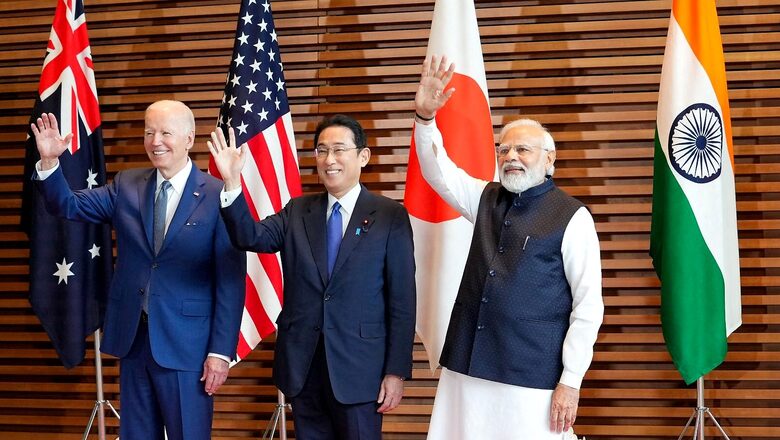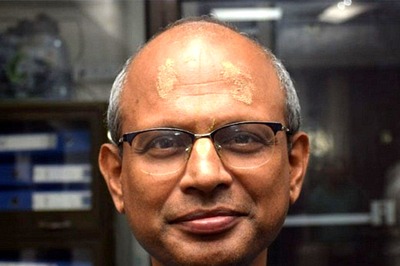
views
In spite of the raging Covid-19 virus that has sent millions of Chinese to hospitals and killed thousands after the sudden U-turn in its quarantine policy, China has not taken its eyes off the prize: Taiwan and the South China Sea. During the last week of December 2022, 71 Chinese fighter jets and drones entered Taiwan’s airspace, hitherto the largest and most aggressive incursions. During the same week, “a Chinese fighter jet flew dangerously close to a US Air Force aircraft that was conducting routine operations over the South China Sea,” so close that it might have caused the planes to collide, reported the New York Times, quoting the US military sources.
From Taiwan and the South China Sea to the Himalayas, China soars up and swoops down like a most ferocious bird of prey. To keep the Indo-Pacific free and democratic and open for international trade and commerce, the United States and its allies must act. Retrenchment from the most dynamic economic region of the world is not a choice for America. Nor is it for Europe.
The Quadrilateral Security Dialogue, the QUAD, composed of the United States, India, Japan, and Australia, provides a secure and economic platform to create a new balance of power structure in the Indo-Pacific region, keeping in mind China’s overarching and aggressive ambitions from Taiwan, the South China Sea, the Indian Ocean to the Himalayas. To defend the Himalayas – India — America’s reluctant ally has realised that it must play a commanding role in the Indo-Pacific, which requires proactive strategic engagement with the region rather than passive strategic autonomy.
Any day and time, China can rattle the Indian psyche by launching a mini attack on a hilltop or a river valley anywhere on the Line of Actual Control (LAC) on the Himalayan borders. By making minuscule military manoeuvres and micro-aggressions in the vastness of the 2100-mile Northern borders, China has been making Indians feel perpetually insecure. The country has been doing so by making false territorial claims and nibbling Indian territory all along the Northern borders. The world takes notice only when the conflict seems to get out of control as it happened in the Galwan River Valley in Ladakh in the Himalayas in June 2020 where 20 Indian soldiers were killed in a bloody clash with the Chinese troops.
China, however, could not ignore the recent happenings in the Himalayas when the United States and Indian troops teamed up to train in the cold weather at 10,000 feet high altitude conditions. The annual joint military exercise called Yudh Abhyas took place in Auli in the state of Uttarakhand, India, 60 miles close to the border with China (Tibet).
It was a clear message to China about the growing US-India military relations in the Indo-Pacific, of which the Himalayas is an integral part. The US Army Pacific tweeted, “Yudh Abhyas reinforces our commitment to the Indo-Pacific region and improves interoperability with our Indian Army partners.” China protested but India ignored; and claimed that the two-week exercise was for humanitarian assistance, disaster relief, peacekeeping, and peace enforcement—which in fact was the initial impulse behind the Quad when it was established in 2004 for the Indian Ocean tsunami relief efforts.
However, the Quad in its 2017 avatar became a totally new entity, a flexible group of four flourishing democracies that saw a convergence of their national interests, especially in the face of China’s militant assertiveness. Maritime security, infrastructure connectivity, and counterterrorism were the issues that the official-level meetings focused on after its revival.
But the Biden administration saw a new role for the Quad in its Indo-Pacific policy towards China. In March 2021, the USA convened the first Quad leaders’ summit, which gave the group a new vision and purpose that would serve the national interest and diplomatic goals of India, Japan and Australia as well as the Indo-Pacific region as a whole.
By the end of the second leaders’ summit meeting held in September 2021, the group’s institutional structure took a concrete shape, consisting of several working groups including the Quad Vaccine Group for producing and delivering a billion Covid-19 vaccine doses for the Indo-Pacific region produced by The Biological E. Ltd (India); the Critical and Emerging Technology Working Group focusing on open, accessible, secure, critical, diversified technology supply chains system; the Climate Working Group focusing on greening the shipping supply chains and disaster risk reduction; the Infrastructure Group aiming at digital connectivity, clean energy, and transport infrastructure in the Indo-Pacific; the Quad Cybersecurity Partnership for developing capabilities for meeting cyber threats, infrastructure and supply chain resilience, and software security standards; the Space Working Group for pooling and sharing satellite data, and monitoring and mitigating climate emergencies; and the Indo-Pacific Partnership for Maritime Domain, launched at the Tokyo summit in May 2022, aiming at enabling the partners to surveil the critical regions of the Indo-Pacific for tactical activities including dark shipping (vessels with automatic identification system turned off), responding to climate and humanitarian contingencies, and protecting marine resources.
The Quad’s geopolitical dynamism in the region continues to grow. Quad partners, with shared democratic values, operating through highly integrated working groups and focusing on not only traditional and non-traditional security issues but equally on trade and economic issues, have begun to transform the organisation into a force for peace and stability and economic growth for the Indo-Pacific region.
The Quad has created an effective system of balance of power in the Indo-Pacific to keep the region secure, open, and accessible for trade and commerce. More importantly, the Quad partners’ economic dynamism based on democratic values provides an alternative to the Chinese authoritarian model.
Dr Batra is the author of several books including the most recent India In A New Key: Nehru To Modi – 75 Years of Freedom and Democracy. He is affiliated with the diplomacy and international relations program in the graduate college at Norwich University, US. Views expressed are personal.
Read all the Latest Opinions here

















Comments
0 comment